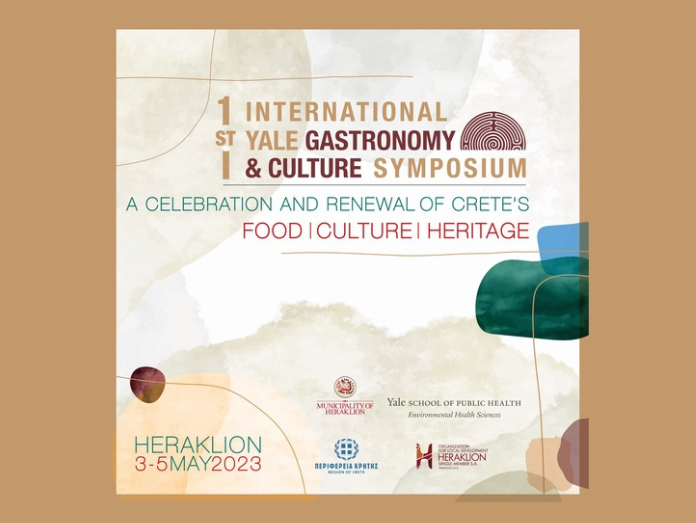The island of Crete had the honor and privilege to host the 1st International Gastronomic and Cultural Symposium, organized in the island’s capital, Heraklion, from May 3 to 5 2023. What emerged as a conclusion is the need to cultivate a proper nutritional culture from an early age. Also, the symposium advocated the merits of the Cretan diet, considered to be the basis for the Mediterranean diet.
The theme of the symposium aims to highlight the cultural and environmental sustainability of local food presented through a triptych that includes the fields of nutritional value, scientific research and health. At the same time, the symposium honored the wisdom of the ancestors, which passes down through the ages and manages food as medicine and a cornerstone of physical, spiritual and mental well-being.
The Symposium was organized by the Region of Crete, the Municipality of Heraklion and Yale University, (Yale School of Public Health and Yale Hospitality), while the overall supervision and editing will be carried out by a scientific committee consisting of Yale professors, Greek academics, distinguished chefs and representatives of the local community of Crete.
In its context, a series of parallel actions were carried out that included, among other things, visits to local producers and tasting experiences of local raw materials, while leading scientists and professionals in the nutrition and food industry from Greece and abroad were hosted -indicatively, Prisco Piscitelli (UNESCO Chair in Health Education and Sustainable Development), Jean-Claude Moubarac (Faculté de Médecine, Université de Montréal), Rick Smilow (CEO, Institute of Culinary Education of NYC), Fedon Alexander Lindberg (Author), Bill Telepan, (Executive Chef Metropolitan Museum of Artat, NYC) and professors from Yale University.
“The Mediterranean diet in recent years has evolved from a healthy diet to a sustainable dietary pattern, as it is mainly plant-based. Without olives, the Mediterranean diet does not exist and the Mediterranean diet promotes sustainability”, emphasized Mrs Antonia Trichopoulou, professor emeritus of Nutrition and Preventive Medicine.
Prisco Priscitelli, president of Unesco’s Health Education and Sustainable Development, argued that “every country can “adopt” a Mediterranean diet, incorporating local products rich in polyphenols, plant fibers and “good” fats into its nutritional model”.
Stergios Pirintsos, Professor of Biology, Ilias Kastanas, Professor of Laboratory Endocrinology, both at the University of Crete, together with author Nikos Psilakis analyzed the beneficial properties of olive oil.



















